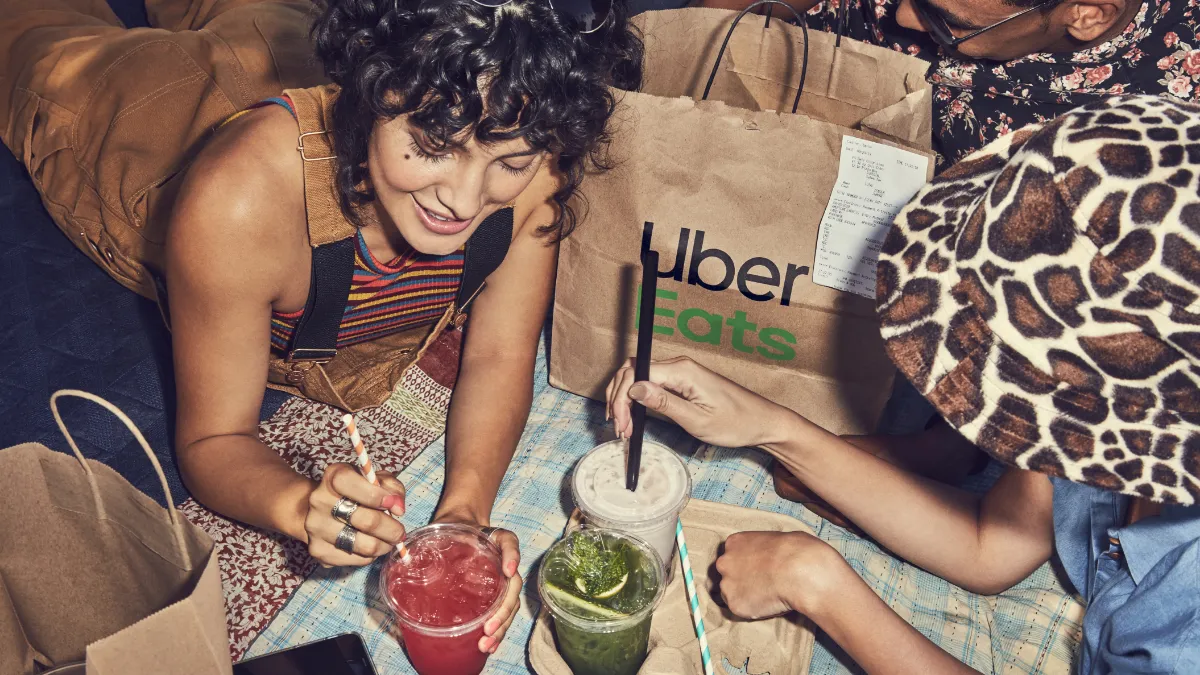Dive Brief:
- Uber’s delivery gross bookings grew 135% year-over-year during Q3 2020 and delivery revenue grew 125% year-over-year, according to an earnings release. In the U.S., gross bookings were up 123% year-over-year, Uber CEO Dara Khosrowshahi said during a Thursday earnings call.
- While Uber Eats' adjusted earnings before income, taxes, depreciation and amortization had a loss of $183 million, this was an improvement of $49 million quarter-over-quarter and $133 million year-over-year, according to the release. During the quarter, the company's EBITDA broke even or better in 10 of its delivery countries, Khosrowshahi said.
- Despite the company’s extensive growth during the pandemic, it has yet to reach a healthy streak of profitability, but Khosrowshahi said the company expects delivery EBITDA to become profitable sometime next year.
Dive Insight:
If Uber Eats becomes profitable next year, it will be ahead of previous analyst predictions that it would lose money on every order until 2024. The pandemic has created unexpected headwinds across the food delivery segment, which have only accelerated demand not just from new users but also from existing customers. Uber Eats’ monthly active platform consumers grew over 70%, Khosrowshahi said. The company also expanded its Uber Eats Pass to four more countries during the quarter and surpassed 1 million paid members across its Uber Pass and Eats Pass, Khosrowshahi said.
Uber Eats has been diversifying its delivery business over the last few quarters, expanding its grocery offering, which had gross bookings exceed $1 billion on an annualized run rate in September, according to the earnings release. Grocery is now available in over 10 countries. The company also launched a prescription delivery pilot and launched ads in the U.S., which were adopted by about 30,000 active restaurants during the third quarter with early positive engagement from enterprise restaurants, including Subway and Panera Bread, according to the earnings release.
The company also grew its restaurant partnerships by over 70% year-over-year, with new small and midsize restaurant additions growing over 60%, according to the press release. Khosrowshahi said there is still plenty of room to grow restaurant partnerships because it still has low penetration in terms of the restaurants being on Eats platform. It currently has about 550,000 restaurants on its platform. In the U.S., it has about 30% of total restaurants on the platform while it has only about 16% in the United Kingdom and 15% in France.
"The growth that we have going forward is going to be many multiples as we penetrate deeper and deeper into newer restaurants," he said.
Uber Eats is working to improve its ease of use and accessibility for its consumers and restaurant partners. In July, it rolled out a pilot program to allow restaurants to offer direct online ordering on their websites for pickup and delivery with no commission through the end of the year. It also began offering additional tools to help manage orders, monitor customer ordering behavior and highlight top-rated restaurants.
What may also help the company maintain its path to profitability is continued pushes to keep its drivers as independent contractors. The passage of Proposition 22 was a big win for companies like Uber, and Khosrowshahi said the company will advocate for more similar laws. He reiterated that even with the passage of Proposition 22, drivers will be guaranteed a minimum earning standard, healthcare contributions, accident insurance, increased safety protections and other benefits.
"Our proposal for a new pragmatic approach is supported by 82% of drivers and 76% of voters," Khosrowshahi said. "And it's a priority for us to work with governments across the U.S. and the world to make this a reality."










